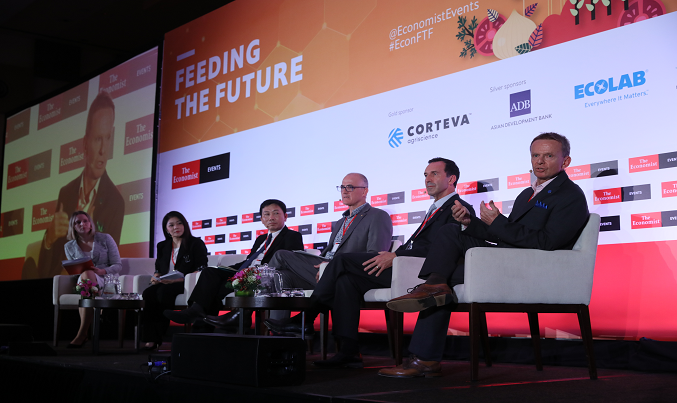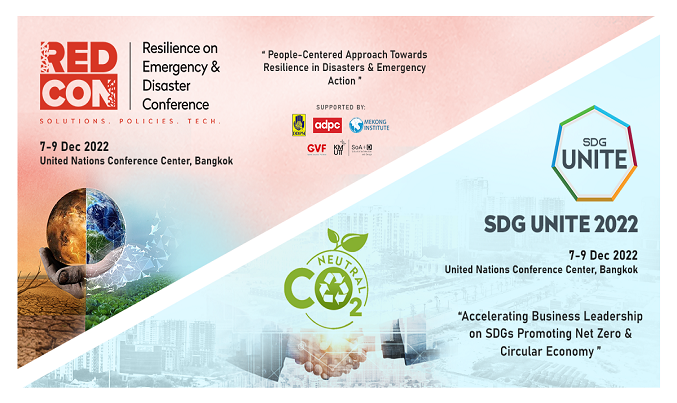July 26th 2019, Singapore –
The Economist Events hosted its first Feeding the Future event today in Singapore which attracted over 150 attendees. It opened up the debate around the economic and geopolitical risks involved in food production, affordability and distribution. The conference also explored the ways science and technology can tackle these issues now and in the future, as well as the challenges surrounding resource scarcity such as water and land. Feeding the Future brought together leading thinkers from government, industry, NGOs, academia, foodtech and agriculture to examine the varied and complex challenges and opportunities across the region.
"Transportation and logistics also contribute to the transformation of the food industry. We see food tracking and traceability technologies positively impacting food distribution and security" - Mike Briers, chief executive, Food Agility
"Farmers could be their own worst enemies by following tradition and cultural roots and not embracing new technologies and practices." - Peter Ford, president, Asia-Pacific, Corteva Agriscience
"Getting foods produced closer to populations should be part of the urbanisation concept." - Shakuntala Haraksingh Thilsted, Research programme leader, value chains and nutrition, WorldFish
"As income increases, people want healthier, high-quality foods and it is important for the meat and livestock industry to provide that choice." - Michael Finucan, General manager, international business, Meat & Livestock Australia
"The influence of marketing greatly impacts food consumption decisions, and finding a balance between quality and affordability is more of a challenge for infants than it is for older children and adults."- Christiane Rudert, Regional adviser nutrition, Unicef
"With improved seed, we see seven times higher yield than before but the most difficult challenge is to produce more food with less land, and less people to work on the land." - Michael Keller, Secretary-general, International Seed Federation
"Countries have become more interdependent; countries with food surplus trade with those with deficits, and this requires a strong trust system when it comes to food security." - Edwini Kessie, director, agriculture and commodities division, World Trade Organization
-
Thuok Nao, Secretary of state, Ministry of Agriculture, Forestry and Fisheries, Cambodia
-
Cherrie Atilano, Founder and chief executive, Agrea Agricultural Systems International
-
Ingrid van Wees, Vice-President for Finance and Risk Management, Asian Development Bank
-
Peter Ford, President, Asia-Pacific, Corteva Agriscience
-
Sean Toohey, Executive vice-president and president, Asia-Pacific, Ecolab
-
Pawan Agarwal, Chief executive, Food Safety and Standards Authority of India
-
Margarita Astrálaga, Director, environment, climate, gender and social inclusion division, International Fund for Agricultural Development
-
Michael Keller, Secretary-general, International Seed Federation
-
Michael Finucan, General manager, international business, Meat and Livestock Australia
-
Wisman Djaja, Director, sustainable agriculture development and procurement, PT Nestle Indonesia
-
Christiane Rudert, Regional adviser nutrition, Unicef
-
Shakuntala Haraksingh Thilsted, Research programme leader, value chains and nutrition, WorldFish
-
Edwini Kessie, Director, agriculture and commodities division, World Trade Organisation
To engage with Feeding the Future on social media, follow @EconomistEvents #EconFTF
SPONSORS
Gold sponsor
Corteva: www.corteva.com
Corteva Agriscience provides farmers around the world with the most complete input portfolio in the industry to enable them to maximize yield and profitability — including some of the most recognized brands in agriculture: Pioneer®, Granular®, Brevant™ seeds, as well as award-winning Crop Protection products — while bringing new products to market through its robust pipeline of active chemistry and technologies. The company is committed to working with stakeholders throughout the food system as it fulfills its promise to enrich the lives of those who produce and those who consume, ensuring progress for generations to come. Corteva Agriscience became an independent public company on June 1, 2019, and was previously the Agriculture Division of DowDuPont. More information can be found at www.corteva.com.
Silver sponsors
Asian Development Bank: www.adb.org
The Asian Development Bank aims to achieve a prosperous, inclusive, resilient, and sustainable Asia and the Pacific, while sustaining its efforts to eradicate extreme poverty. ADB assists its 68 members by providing loans, technical assistance, grants, and equity investments.
Ecolab: www.ecolab.com
Ecolab is the global leader in water, hygiene and energy technologies and services with presence across 170 countries around the world with annual sales of $14 billion and 48,000 associates.
Meat & Livestock Australia: www.mla.com.au
Meat and livestock Australia Limited (MLA) is an industry research and marketing body that services Australia’s cattle, sheep and goat producers. MLA has approximately 50,000 livestock producer members from all over Australia. The Industry body conducts research and development from paddock-to-plate and promotes Australian red meat to consumers around the world, with the aim of driving the profitability, sustainability and global competitiveness of the industry.











